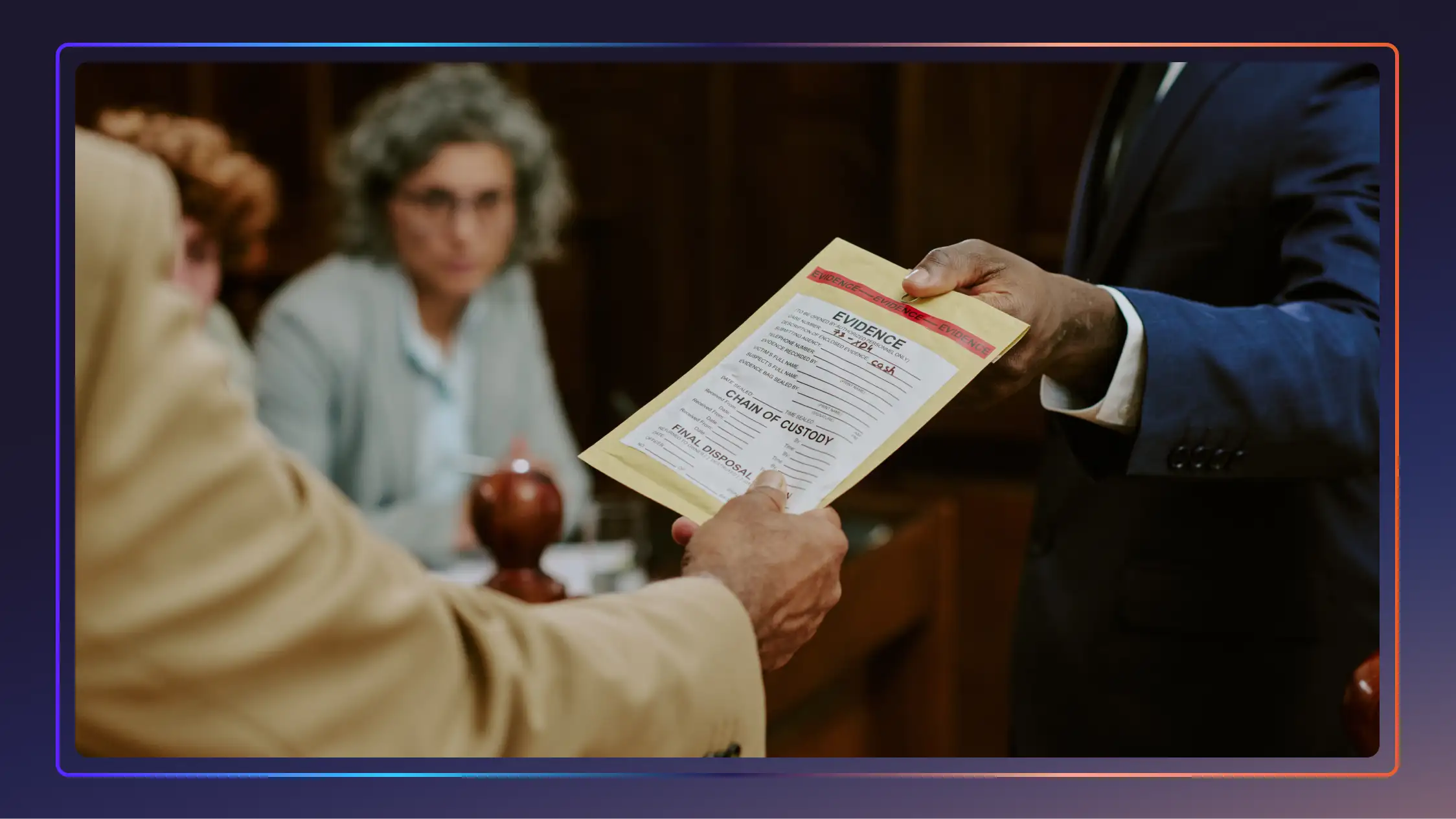Cybersecurity for Law Firms: 8 Ways To Improve Your Company Safety
Legal cybersecurity is a critical concern for today’s law firms. Learn eight strategies for protect your clients’ most sensitive data.

Cybersecurity has become a pressing concern for law firms of all kinds. According to the American Bar Association’s (ABA) 2023 Cybersecurity TechReport, 29% of legal firms reported they have experienced a security breach, up from 27% in 2022.
Data safety and privacy is an issue wherever there is sensitive personal information involved — which is to say, virtually everywhere in the world of law. And a mistake in this area represents more than a minor mishap or embarrassment — it could have significant consequences for your client and the firm as a whole.
Whether you represent a large firm or a small court reporting agency, your legal data security practices must be up to snuff. Here’s what you need to know about cybersecurity for law firms.
Why Do Law Firms Need to Invest in Cybersecurity?
Many law firms have already been victims of cyber threats, from phishing attacks to malware installations, with a wide range of consequences. According to security operations firm Arctic Wolf, the average ransom for law firm cybersecurity breaches in 2023 stood at $1 million. Many are much higher than that. No matter your firm’s resources, these are eye-popping numbers.
That doesn’t include the costs of collateral damage, either. Breaches may involve sensitive personal information about tens or hundreds of thousands of clients, sometimes resulting in irreparable reputational harm. Law firms’ IT security teams often spend hundreds of hours in overtime attempting to clean up the wreckage from a legal cybersecurity breach.
Consequently, many regulations and recommendations are already in place to guide law firm cybersecurity best practices. For instance, the ABA’s Rule 1.6 instructs that firms must “make reasonable efforts to prevent the inadvertent or unauthorized disclosure of, or unauthorized access to, information relating to the representation of a client.” Similarly, Formal Opinion 483 concludes that firms “have a duty to notify clients” of any data breaches that may involve their personal information.
Other regulations apply across a variety of industries but also demand law firm compliance. For example, the Health Insurance Portability and Accountability Act (HIPAA) may have significant implications for personal injury firms dealing with sensitive medical data. Europe’s General Data Protection Regulations (GDPR) law can also apply in a legal context — say, when court reporters must store sensitive client depositions. State laws like the California Consumer Privacy Act (CCPA) are modeled after GDPR and can affect legal practices in the U.S.
These are just a few examples, but the overarching point is clear: Lawyers and legal firms should give more than just a passing thought to their cybersecurity practices.
Assets That Need Protecting
Regardless of size, law firms are vast storehouses of private, legally protected files and information. Client data and sensitive documents are part and parcel of case management, and client communication via email, phone recordings, and meetings often involves sensitive topics. Firm files and financial records are full of critical information that could cause legal problems in the event of a breach.
Recordings and transcripts often include particularly sensitive information and discussions of private case details. That’s why Rev has strict security protocols in place when it comes to recording and transcribing any legal depositions or other sensitive conversations.
More broadly, firms also rely on a variety of IT systems to communicate with clients and other key players in the legal system. From client portals to research databases and even case management systems, each technological touchpoint represents a potential locus of risk for law firm cybersecurity.
Cybersecurity Strategies in the Legal Field
Implementing robust cybersecurity for law firms is a complex, multilayered task. To ensure your bases are covered, consider the following strategies.
1. Conduct Routine Security Audits
Security audits are the foundation of any cybersecurity program. You should conduct a detailed review of all systems involved in information storage and communications to determine any points of vulnerability. This is the surest way to prevent an attack before it happens.
In general, data security audits and risk assessments should be a regular practice at any legal firm. However, when you’re getting started or reevaluating your current systems, it’s best to bring in a third-party audit service to conduct a thorough review. Some clients may even demand proof of an independent audit before committing to your firm’s services.
2. Create a Cybersecurity Policy
With a full cybersecurity review in hand, you can establish a clear set of policies and directives for all firm employees and any vendors you work with. This includes guidelines around email and computer use, remote access, social media, and more.
The ABA’s 2023 report mentioned above revealed that only around half of firms have clear policies of this kind in place. That means establishing clear guidelines puts you ahead of half your competition.
3. Limit Access
Implementing strict protocols and projections around user access is one of the most important practices for law firm cybersecurity. It starts with multi-factor authentication (MFA), which requires layers of verification from any employee or partner before granting access. This is especially important for remote court reporters who take depositions or record courtroom proceedings.
Besides MFA, however, it’s also critical to take a conservative approach to granting access. Staff and vendors should only have access to the minimum amount of information and documentation required to do their jobs, and nothing more. Make ongoing law firm compliance in this area part of your routine audits.
4. Train Employees on Law Firm Cybersecurity
Of course, policies and access rules are no good if employees don’t understand them or know how to use the relevant tools. That’s why cybersecurity is an essential part of any employee training protocols. Staff should be required to learn the rules — and consequences for violating them — both when they’re hired and anytime changes are made.
This would also apply to situations where an employee moves from in-person to remote work. For example, a court reporter who starts recording proceedings remotely should be trained on the rules for this setup before making the transition. In addition, if your firm has begun integrating AI into your workflow, then training on AI law would be a must for the wider team.
5. Employ Data Encryption
Encryption transforms information to make it unreadable to anyone without a special key. It’s a fundamental way to protect any personal identifying information or other sensitive data, whether it’s stored locally, pushed to the cloud, or transmitted over the internet.
Encryption is crucial anywhere online communications and data storage transmission are involved, whether at a large legal firm or a small court reporting agency. Yet, the ABA reported that only half of firms use file encryption, and just 40% use email encryption tools. These are startling numbers in an arena that involves so much sensitive information.
6. Practice Secure Communications
Besides encryption, there are many other ways to secure firm communication channels and prevent access. For instance, this might involve using a secure messaging system instead of email, or a private file transfer portal for sending and receiving documents.
Where remote court reporting or client video conferencing are involved — increasingly common practices in today’s remote work world — meeting rooms should be locked and password protected, screen sharing should be limited, and live captions secured.
Security is equally important when traditional mail is involved. Firms should only rely on registered or certified mail for transmitting sensitive legal documents to ensure maximum protection and verification of receipt.
7. Plan for the Worst-Case Scenario
All these steps are designed to prevent the worst from happening. But, as lawyers know all too well, criminals are always looking for new ways to break through. Even with the best cybersecurity systems in place, your firm may fall victim to an attack.
These aren’t meant to be doomsday predictions, but rather to help firms avoid those outcomes. Planning for the worst can keep it from becoming a reality. That plan should include details about what must be communicated, how to quickly change passwords or cut off points of vulnerability, and steps for handling any potential fallout.
8. Consider Cyber Insurance for Your Law Firm
With the growing threat of cyberattacks, it’s no surprise that cyber-insurance premiums are rising rapidly. Nonetheless, the cost of coverage is pennies compared to what your firm will pay to deal with a cyberattack.
Cybersecurity insurance can help offset the fees that come with handling a data breach, including loss of income during downtime, forensic investigations, and crisis management. Cyber-liability insurance, meanwhile, protects firms and court reporting agencies from liability claims in the event of a data breach. Both are worth careful consideration as you establish your plans for legal data security.
Best Tools and Resources for Long-Term Cybersecurity
Achieving law firm compliance and mitigating cyber threats is no small task — especially since it’s outside the primary training of legal professionals. Robust security practices require a variety of tools and resources, including the following:
Aside from these tools, it’s important to stay abreast of the latest trends and best practices for cybersecurity and law. The ABA’s cybersecurity resources are a good place to start, as well as this set of resources for lawyers from America’s Cyber Defense Agency.
Enhance Your Law Firm’s Cybersecurity With Rev
In the modern workplace, digital communication, cloud-based computing, and remote work have affected legal firms and court reporting agencies just as much as other work environments. However, a law firm’s role as a hub of extremely sensitive client information makes it uniquely vulnerable to cyber threats. Now, more than ever, cybersecurity and law practice must go hand in hand.
Where transcription is required, such as with recorded depositions or court proceedings, Rev provides simple, streamlined cybersecurity for lawyers and court reporters. Rev is SOC 2 Type II Security Compliance Certified and HIPAA compliant, and our industry-leading AI-powered transcription services can provide peace of mind for your firm.
Ready to stay secure? Start with Rev’s reliable, accurate legal transcription services.














.webp)

